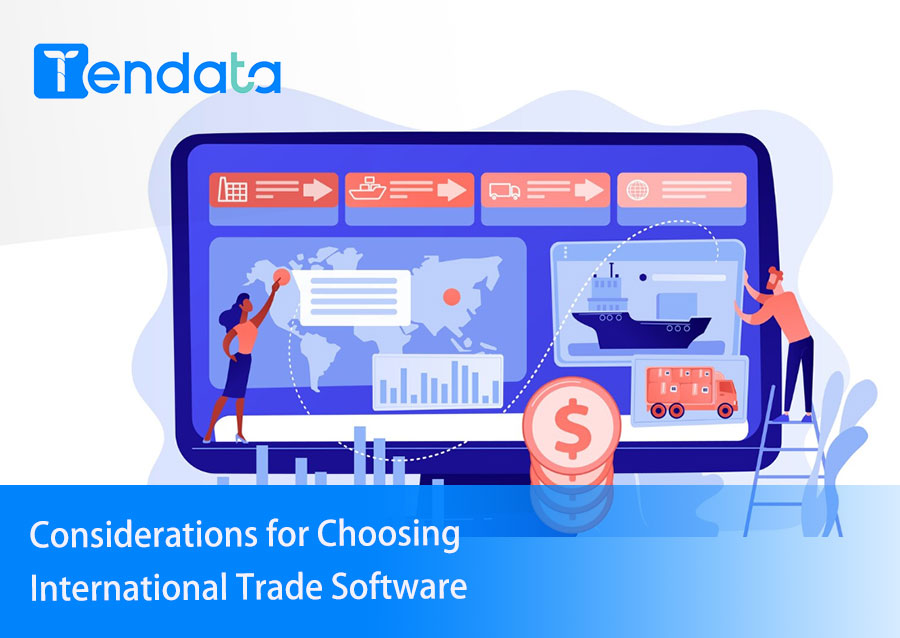 Trade Data Provider
Trade Data Provider
 16-11-2023
16-11-2023
In today's global market, many international trade enterprises aim to establish a solid presence in foreign markets. An increasing number of businesses prioritize the use of office software that meets the requirements of international trade marketing and customer management. These software solutions help streamline customer management and enhance overall efficiency. In the current software market, there is a mix of high-quality and subpar international trade software, making the selection process challenging. Here are some key points to consider when choosing international trade software, tailored for businesses seeking to develop clients abroad.

1. Meeting Core Business Needs:
Different industries have varying requirements for system functionality, and software costs generally increase with more features. Software providers often offer packaged or modular solutions. Practical software should encompass functions relevant to the business. Modular options allow for initial selection based on the company's operational needs, with the ability to add or upgrade modules as the business grows. Additionally, the ease of operation for both management and frontline staff should be a priority.
For businesses with diverse international trade software needs, it is advisable to choose comprehensive solutions covering functions such as email marketing, global trade data, Facebook social media marketing, automation, and customer management. This ensures the software meets various international trade scenarios.
2. Ensuring System Stability and Updates:
It is recommended to prioritize software developed by companies with independent research and development capabilities. Some software vendors lack the expertise and core technology, resorting to irresponsible sales tactics that may result in data transfer disruptions, unstable software, and complicated operations. These vendors often struggle to provide adequate after-sales service and may lack ongoing technical support. Opting for such vendors can lead to poor post-purchase experiences, so it's advisable to avoid them.
3. Availability of Software Demonstrations:
Before making a purchase, international trade businesses should request software service providers to conduct demonstrations. During these demonstrations, any concerns should be raised immediately. Genuine purchase decisions should only be made after receiving commitments from the software service provider. After purchase, designated personnel should undergo training, and any issues identified during the learning process should be promptly communicated to the software service provider. Reputable providers offer robust after-sales services.
International trade software plays a significant role in customer acquisition. These tools often allow precise targeting of specific regions, selection of industry keywords, and bulk acquisition of customer contact information. When selecting software, it is crucial to understand how the software effectively develops international clients. Opt for solutions that can accurately pinpoint product demands and efficiently gather customer contact information.
The effectiveness of software like Tendata International Trade Gateway has been proven. Tendata enables online searches for quality foreign trade buyers from 200 countries. Its features include detailed global importer searches, decision-maker contact information retrieval, in-depth exploration, customs trade alerts, and email marketing.
>>Click here to inquire about a free trial <<
Customer development is always a primary focus for us in international trade. Having customers leads to orders. But if we're looking to start a business or expand our development channels, what are the available avenues for customer development? And what are the characteristics of these customer development channels?
The traditional undifferentiated marketing approach mostly involves extensive investment to achieve broad coverage. In the Marketing 1.0 era (Industrial Age) and the Marketing 2.0 era (Internet Age), the marketing demand of companies is to precisely locate their target customers within a massive audience (or potential audience). They also need to understand the procurement-supply relationships, price ranges, purchasing frequency, and style preferences of these target customers. This is akin to finding a needle in a haystack.

Tendata can assist foreign trade enterprises in better customer development. Once a company has precisely targeted a market (or region) using Tendata's data, the next step is to further pinpoint high-quality customers within that market, creating customer "profiles" and filtering out target customers that match one's own supply capabilities. (>>>Click to Develop New Customers)
Category
Leave Message for Demo Request or Questions


 T-info
T-info T-discovery
T-discovery

 My
Tendata
My
Tendata Market Analysis
Market Analysis Customer
Development
Customer
Development Competitor
Monitoring
Competitor
Monitoring Customer Relationship
Customer Relationship





































































































































